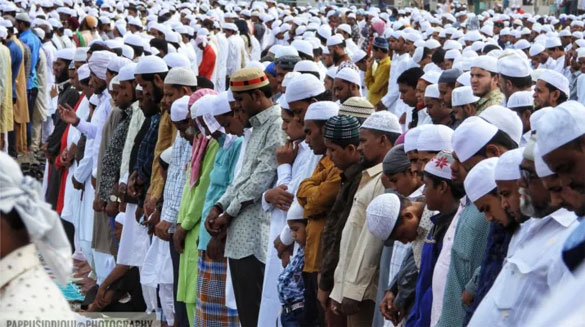 Dr. Mohammad Najeeb Qasmi, New Age Islam
Dr. Mohammad Najeeb Qasmi, New Age Islam
20 July, 2021
Eid-ul-AdhaPrayer: The Eid-ul-Adhaprayer is compulsory. It has two Rak’ahs which are to be performed in congregation. The time of Eid-ul-Adha prayer commences after the rising of the sun, which lasts until Zawal, but it is not appropriate to delay too much. There are six extra Takbeer in Eid-ul-Adha. The jurists differ regarding the number of these extra Takbeer. But the Muslim Ummah agreed that more or less number of extra Takbeer does not make salah invalid. Abu Hanifa, the famous jurist and expert of Hadeeth, who was born in 80 Hijri, is of the opinion of six extra Takbeer.Both Adhan and Iqamah are called for Friday prayer. But there is no adhan or iqamah for Eid-ul-Fitr and Eid-ul-Adha prayers.The conditions which apply for Friday prayer, the same also apply for Eid prayer, those on whom Friday prayer is compulsory is also Eid prayer is compulsory for them. Where Friday prayer is permissible, Eid prayers is also permissible. Just as Friday prayer can be offered in different places, Eid prayer can also be offered in different places in the same city.
How to offer Eid prayer: Make niyyah of prayer first. The niyyah actually is the name of intention within the heart. It is better to say with tongues that I am going to perform the obligatory Eid prayer with six additional takbeers. Then tie your hands saying Allahu Akbar and read Subhanak Allah... And then raise both hands up to the ears like TakbirTahrimah and say Allahu Akbar three times, release your hands after two Takbirs and tie your hands after the third Takbir. After tying hands, the Imam should recite Surah Al-Fatihah and any Surah. The followers should listen to the recitation in silence. Then complete the first rak'ah like a normal prayer. In the second rak'ah, the Imam should first recite Surah Al-Fatihah and any Surah. The followers should listen to the recitation in silence. After the recitation is completed, raise both hands up to the ears and say Takbir three times. Then bow down saying Allahu Akbar and complete the rest of the prayer like normal prayers. You can ask for dua after Eid prayer but dua is not masnun after khutbah.

Eid-ul-AdhaSermon: It is Sunnah that the Imam should deliver the sermon after the Eid-ul-Adhaprayer. People who keep talking during the sermon or leave the sermon are actually are committing the wrong. A short prayer should be offered and a short sermon should be delivered in the lockdown. The sermon can also be read by looking into a booklet. If no one can deliver a sermon in any place, then the Eid prayer will be performed even without the sermon, because the sermon of Eid is Sunnah and not obligatory. Short surahs of the Holy Quran can also be recited in the sermon. Two sermons should be given like on Friday. Between the two sermons, the Imam should sit on a stair or chair for a while.
If a person is not able to offer Eid prayer due to lockdown in any place of the world, then he should perform four rak'ats (2 + 2) of Chasht. It is narrated from Hazrat Abdullah bin Masood RA that whoever misses the Eid prayer, he should perform four rak'ahs.
Greeting of Eid after Eid prayer: Hugging or shaking hands after Eid prayer is not a Sunnah of Eid, and there is an outbreak of coronavirus these days, so avoid hugging or shaking hands after Eid prayer. Because taking precautionary measures is not against Islamic law.
Sunnah of Eid: Taking bath, using Miswak, putting on the best available clothes, applying perfume, using separate routes to and from the praying ground and saying takbir (اَللّٰہُ اَکْبَر، اَللّٰہُ اَکْبَر،لَا اِلہَ اِلَّا اللّٰہ، وَاللّٰہُ اَکْبَر، اَللّٰہُ اَکْبَر، وَلِلّٰہِ الْحَمْد) are among the acts of Sunnah for this day.
Takbir -e- Tashreeq: From the first Dhu'l-Hijjah, every person should take special care to recite Takbir -e-Tashreeq. The words of Takbir -e- Tashreeq are: اَللہُ اَکْبَر، اَللہُ اَکْبَر،لَا اِلہَ اِلَّا اللہُ، وَاللہُ اَکْبَر، اَللہُ اَکْبَر، وَلِلہِ الْحَمْدAllahu Akbar, Allahu Akbar, La ilahailla Allah, waAllahu Akbar, Allahu Akbar, waLillahalhamd (God is Great, God Is Great, There is no God But Allah, God Is Great, God Is Great, All praises be to Allah). Starting from the Fajr of 9 Dhul-Hijjah to the Asr of 13 Dhul-Hijjah, in every 23 prayers, after every obligatory prayer, this Takbir must be recited. The special virtue of fasting on the 9th of Dhul-Hijjah has been specifically mentioned in the hadiths.
Eid-ul-Adha Sacrifice: In the light of Qur'an and Hadith, the Islamic scholars have written that Sacrifice is obligatory on everyone who can afford it. Only one sacrifice from all the members of a household is not enough, rather, every affordable Muslim (who is in possession of about 35,000 Rupees) should make a sacrifice on his behalf. It is better for a person to make more than one sacrifice, because according to the command of the Holy Prophet (صلى الله عليه وسلم) no good deed in the days of sacrifice is more beloved and pleasing to Allah than shedding the blood of the sacrifice.One partis allowed in a male and female goat, ewe, male and female sheep, and young sheep, while 7 people can participate in cow, ox, buffalo, and camel. The male and female goat must be of one year old, while cow and buffalo must be 2 years old and camel must be 5 years old. Avoid cow sacrifice in the places where cow sacrifice is banned by the government. Sacrifices can be performed at any time of the day or night, from 10 Dhu al-Hijjah till the sunset of 12 Dhu al-Hijjah. But it is better to do it during the day and particularly on the first day. The stove used not to burn in the house of the Holy Prophet, for many consecutive months due to the lack of foodstuff, yet he used to offer sacrifices every year with special care. Since, the sacrifice is an Islamic motto and obligatory, every effort should be exerted to slaughter animals on the day of sacrifice. If for some reason you cannot sacrifice yourself, get it to be done somewhere else. By the way, if the sacrifice cannot be offered on the day of sacrifice despite the effort is made, then the price of the sacrifice should be distributed among the poor after the days of sacrifice have passed. The sacrifice is a charity. The Nafil sacrifice can be also offered by the deceased just like other Nafil alms that we normally use to offer by them. HazratAli (RA) the cousin and son-in-law of the holy prophet (SAWS) used to offer sacrifices in his whole life, on his behalf (SAWS) every year since his death. The sacrificial animal must be flawless and healthy. The Sacrifice will take place only after Eid prayers in the cities. However, in the villages where Eid prayers are not offered, the sacrifice can be performed at any time after dawn. It is not necessary to make three parts of the sacrificial meat and be distributed, but it is better to be done like this: One part for your home, another for relatives and a third for the poor. Islamic teachings have drawn special attention towards cleanliness and purity, therefore, on this occasion, make complete arrangements for cleanliness and do not put the sacrificial waste in a place that will cause any inconvenience to anyone.
How to sacrifice: lay down the animal on its left side, recite BismillahAllahu Akbar and slaughter the animal with a sharp knife in such a way that the four veins are cut. The "throat": the windpipe, the "visible": the esophagus, the "Jugulars": the two blood vessels called the aorta. Even if three of these four veins are cut, the sacrifice will still be halal. The neck should not be totally cut off at the time of slaughter. After slaughtering, leave the animal for a while so that all the blood comes out. Then take off/peel the skin. Read this supplication before slaughtering the animal.
إِنِّیْ وَجَّهْتُ وَجْهِیَ لِلَّذِیْ فَطَرَ السَّمَاوَاتِ وَالأَرْضَ حَنِیْفاً وَمَا أَنَاْ مِنَ الْمُشْرِکِیْنَ۔ إِنَّ صَلاَتِیْ وَنُسُکِیْ وَمَحْیَایَ وَمَمَاتِیْ لِلہِ رَبِّ الْعَالَمِیْنَ۔ لاَ شَرِیْکَ لَہُ وَبِذَلِکَ أُمِرْتُ وَأَنَا أَوَّلُ الْمُسْلِمِیْنَ
Read this prayer after slaughter
اَللّٰهُمَّ تَقَبَّلْ مِنِّیْ کَمَا تَقَبَّلْتَ مِنْ خَلِيْلِکَ اِبْرَاهِيْمَ عَلَيْہِ السَّلَام وَحَبِيْبِکَ مُحَمَّد صَلَّی اللہُ عَلَيْہِ وَسَلَّم
If the sacrifice is offered on behalf of someone else, say "Min" instead of "Minni" and name that person. And if there are seven participants in the sacrificial animal, then the names of the seven are to be inevitably mentioned.
URL:
New Age Islam, Islam Online, Islamic Website, African Muslim News, Arab World News, South Asia News, Indian Muslim News, World Muslim News, Women in Islam, Islamic Feminism, Arab Women, Women In Arab, Islamophobia in America, Muslim Women in West, Islam Women and Feminism

No comments:
Post a Comment